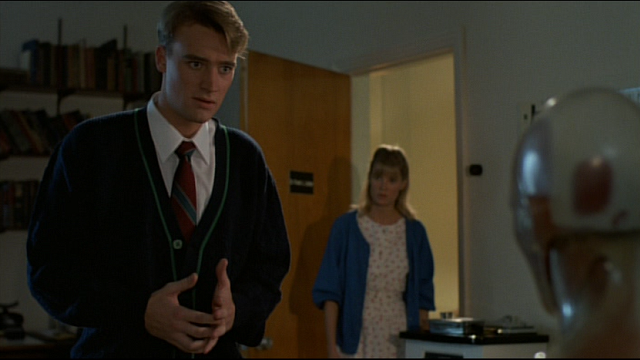Every time there is a new adaptation, reboot, reimagining, or remake of a geeky cult classic, a hoard of geeks cry out with the same refrain, “You’re ruining our childhood!” It happened with Ghostbusters, Total Recall, Robocop, Friday the 13th and any number of other properties embraced by children. These features are warm comfort food, and any change to the original recipe, no matter how flawed that recipe is, will be seen as somebody selling their childhood nostalgia back to them with a knock-off product. On the one hand, that’s exactly what film companies are doing; on the other hand, this steely tight-fisted grip on one’s past is a form of nostalgia that borders on pathology.
Leon (David Hewlitt; yes, Stargate‘s Dr. Rodney McKay) is a boy who also develops an extreme attachment to his childhood obsessions. His stay-at-home mother (Brownen Mantel) obsesses over finding any dirt or disarray in her house, demanding strict orderliness from her two children. His father (Terry O’Quinn), a town doctor, is so emotionally demanding and clinically removed from his children that he can only communicate to them through ventriloquism. The good doctor’s chosen dummy is Pin, an educational medical mannequin with all of the skin replaced with a cold shiny plastic to display all of the muscles of the body.
Normally, children seek solace from their home life in their friends, but Leon’s mother discourages him and his sister, Ursula, from playing outside or bringing home friends who can’t meet her standards of cleanliness. Pin, with his sheared lips and cold tinny voice, is Leon’s only confidante and friend. It’s only through Pin that his father can offer advice and comfort, and it’s only Pin that gives the children their sexual education. Pin is the holder of wisdom because he’s their father’s voice if their father could shirk his professional separation and connect with his children as anything more than patients. Leon’s obsession with and belief in Pin is only cemented when he sees a lonely nurse have sex with Pin one night after the office has closed.
When Leon grows up, he doesn’t put away childish things. He still believes in Pin and that Pin knows everything best for them, and his father is still content to keep up appearances thinking its just a warm connection to his children. When the obsession becomes too unhealthy, and his father decides to change Pin, everything goes awry. What’s a boy to do when faced with adulthood without his comfort blanket? What did Pin ever do wrong? Aren’t things better like they should?
Watching Pin…A Plastic Nightmare in the years after GamerGate and Ghostbusters feels less like the dark absurdist Canadian cult horror it was and more like a metaphorical warning on the weight maladjusted people put on their childhood memories. Written and directed by Sandor Stern (who wrote the screenplay for the original The Amityville Horror), Pin is a Canadian export made on the cheap. The on-the-fly style foretells Stern’s lengthy career in TV Movies of the Week (Without Her Consent, Web of Deceit, Deception: A Mother’s Secret), except the content is much darker and stranger. Pin is a horrifying creation to this day, especially considering it represents all of our childhood fantasies and nightmares wrapped into one shiny mannequin. It may not have frightened me, but it creeped me the fuck out.

